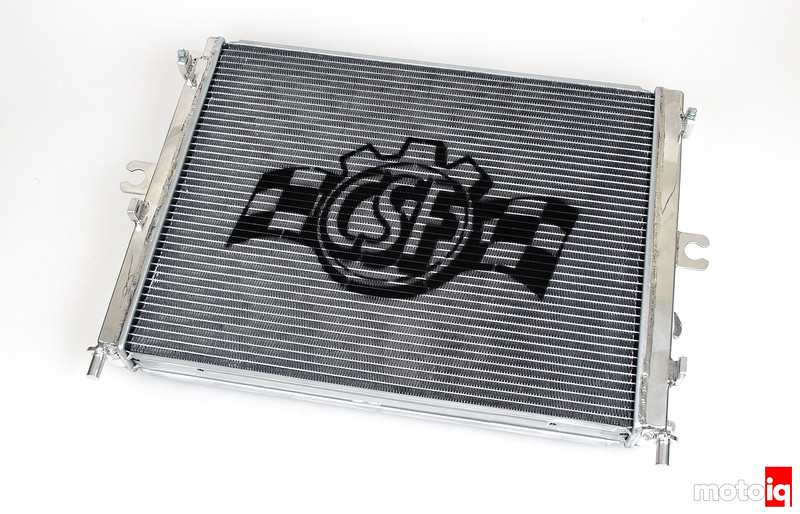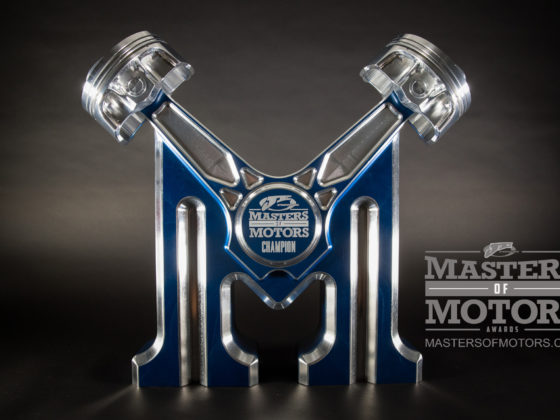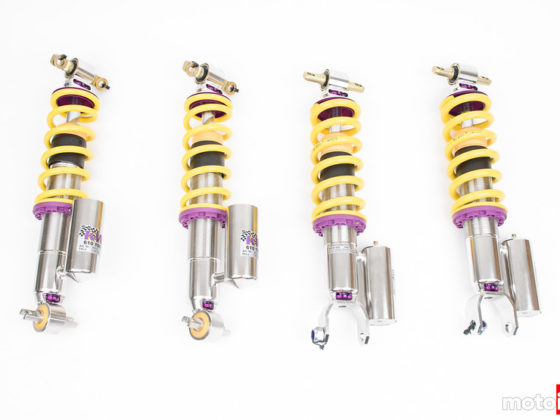

Our cooling system was in need of an upgrade anyway due to the aging hoses with coolant caking on the ends and the faint whiff of coolant after the car was shutoff. Most of the time we justify upgrades due to potential track use but being in Phoenix, surface temperatures on the freeway can easily exceed 130 degrees in the summer so the environment is about as extreme as it gets. We contacted CSF who makes a radiator specifically for our application with the automatic transmission cooler integrated in the radiator. As an added bonus they also include a new condenser for the A/C system but it means we have to discharge our A/C to install the new condenser.
 CSF uses a specially engineered B-tube fin design in their radiators for strength and increased cooling efficiency. They are 15% more effective than a traditional oval shaped tube helping them exchange heat more efficiently. Fin specifications are designed for each application and wind-tunnel tested in the CSF lab. Their radiators are also individually leak tested, vibration tested, thermal cycle and burst pressure tested.
CSF uses a specially engineered B-tube fin design in their radiators for strength and increased cooling efficiency. They are 15% more effective than a traditional oval shaped tube helping them exchange heat more efficiently. Fin specifications are designed for each application and wind-tunnel tested in the CSF lab. Their radiators are also individually leak tested, vibration tested, thermal cycle and burst pressure tested.





8 comments
As somebody who used to be a Nissan tech that had to diagnose a G37X with the sport package added, leading an article with a radiator pic doesn’t confuse me in the slightest 😛
That being said, my Snap-On Modis Ultra can read the factory trans temp datastream faster than it takes for the OEM Nissan CONSULT3+ scantool to even manage to connect to the the ECU and allow you to choose which PID data to display on it, but I daresay that sending unit is a damned sight cheaper than a Modis Ultra. Kind of surprised UpRev doesn’t have any means of reading PID data via a connected PC?
When I asked Up-Rev about it they said the data for the transmission temps was encrypted but I assume all the data is encrypted but then you have to find what’s what and map the values. UpRev does have the oil temp because in part 2 when we had the car on the dyno it was going up pretty high 😀 before we had to stop tuning to let the temps drop. It seems the car needs all sorts of help in the cooling department if your doing anything beyond a normal commute and occasional stoplight or freeway onramp blast.
Be prepared to replace that radiator in 2 years. Koyo was supposed to be the go to but they don’t offer an ac condenser.
http://www.the370z.com/engine-drivetrain/70708-radiator-csf-mishimoto-17.html
We find CSF radiators to be high quality and long life.
Can only speak from our experiences, but our 370Z Project had the CSF radiator/condenser combo for a year and a half without a single issue. It was then outfitted with the CSF triple-pass radiator and that has been on the car since 2014 – also with zero issues. Here are the links to those articles:
https://motoiq.com/project-nissan-370z-keeping-it-cool-with-a-csf-radiator-hps-hoses-and-a-nissan-motorsports-oil-cooler/
https://motoiq.com/project-370z-heated-battle-testing-the-csf-triple-pass-radiator/
To measure the volume difference between the radiators, you could have plugged one end of each radiator, filled it up with water(measured) and compared.
Of course you cannot plug one end/side until full are you will not be able to fill it.🤔